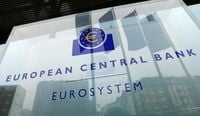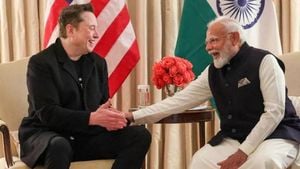The Swiss franc is currently demonstrating its reputation as a safe haven, largely due to the erratic trade and economic policies of U.S. President Donald Trump. Investors are increasingly moving their assets from the dollar to the franc, as evidenced by the recent shift in currency exchange rates. As of April 11, 2025, the Dollar/Swiss franc exchange rate stands at 0.8203, a significant drop from 0.8529 just a day earlier. The franc even reached a record low of 0.8141 overnight, reflecting heightened investor anxiety.
Simultaneously, the euro has also gained ground against the franc, currently trading at 0.9273, a slight increase from the previous day's rate. The Euro/Dollar exchange rate has seen similar fluctuations, now at 1.1302, rising from 1.1216 the night before and 1.0991 earlier that week. Notably, the euro surged to as high as 1.1383 against the dollar, marking its highest point in over two years.
This strengthening of the franc and euro can be attributed to the uncertainty surrounding Trump's unpredictable economic decisions, which have left investors wary. A trader noted, "The erratic and aggressive approach by Trump has destroyed much trust in the dollar," leading to a considerable withdrawal of investments from U.S. assets.
In light of these developments, Commerzbank has forecasted a longer-term devaluation of the U.S. dollar. The bank suggests that the U.S. government is intent on eliminating its trade deficit, using tariffs as one tool and a weaker dollar as another. This situation raises questions about how much longer Trump will tolerate a strengthening dollar, as any upward movement could trigger intervention from the president himself.
To further weaken the dollar, Trump has already called for interest rate cuts from the Federal Reserve. This potential pressure on the U.S. central bank adds another layer of complexity to the current economic landscape.
Meanwhile, the strength of the franc has led economists to speculate about possible actions from the Swiss National Bank (SNB). According to a new study by UBS, a rate cut in June 2025 may become necessary if the franc does not weaken. However, the SNB has refrained from commenting on potential measures in response to the franc's strength.
UBS economists have outlined several options for the SNB, including foreign exchange market interventions to counteract the upward pressure on the franc. However, such interventions could risk escalating trade conflicts with the U.S. if perceived as currency manipulation. The most drastic measure would be an emergency interest rate cut, which would only be considered if the SNB believes that inflation and growth prospects have significantly worsened.
As the dollar continues to weaken, Deutsche Bank has also raised alarms about a potential crisis of confidence in the currency. George Saravelos, head of foreign exchange research at Deutsche Bank, warned that the dollar's status as a safe haven could be jeopardized due to the ongoing trade tensions and the unpredictable nature of Trump's policies. He stated, "We are increasingly concerned that the dollar is exposed to a broader crisis of confidence."
The euro's recent rise to its highest level against the dollar in six months further underscores the dollar's challenges. Despite Trump's announcement of a tariff pause for most countries, the euro remains significantly stronger than it was during the weeks following his election.
Fears abound that Trump's aggressive trade measures could trigger a recession, forcing the Federal Reserve to implement multiple interest rate cuts. Saravelos emphasized that the dollar's characteristics as a safe haven are being eroded, leading to concerns about disordered fluctuations in exchange rates.
Moreover, the U.S. economy's reliance on continuous capital inflows to manage its debts and current account deficit adds to the stakes. A decline in these inflows could have severe consequences for the dollar's stability.
As the situation unfolds, the implications of a loss of confidence in the dollar extend beyond U.S. borders. A crisis could present new challenges for the European Central Bank (ECB), which is wary of an externally imposed disinflationary shock. Such a scenario, coupled with a strong euro and tariffs on imports from the Eurozone, could severely impact European businesses and complicate the ECB's monetary policy.
In conclusion, the interplay between Trump's trade policies, currency fluctuations, and investor sentiment paints a complex picture for the global economy. As the dollar faces mounting pressure, the ramifications for both the U.S. and international markets could be profound, necessitating close attention from economists and policymakers alike.







